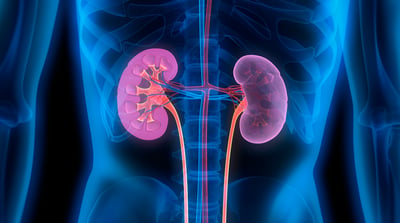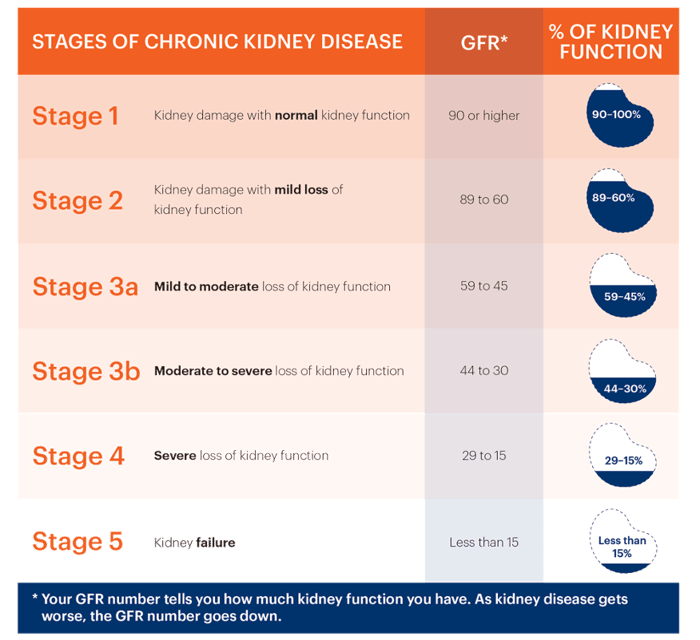Chronic Kidney Disease and Diabetes – What You Should Know
By Eliza SkolerJimmy McDermott
 Diabetes is the leading cause of chronic kidney disease and kidney failure. This article discusses kidney disease, its risk factors, and ways to improve kidney health
Diabetes is the leading cause of chronic kidney disease and kidney failure. This article discusses kidney disease, its risk factors, and ways to improve kidney health
What are kidneys and what do they do?
The kidneys are two organs that filter blood, balance the body’s fluids, and regulate blood pressure. The process of cleaning out waste and extra water creates urine. The kidneys also help keep bones healthy and produce several vital hormones.
Most people have two kidneys, located near the lower back. When a kidney is damaged, it can no longer filter blood as effectively.
What is chronic kidney disease?
Also known as chronic renal disease or nephropathy, chronic kidney disease (CKD) occurs when the kidneys cannot properly filter the fluids that pass through them. CKD can cause a wide variety of symptoms, due to excess waste in the blood. Symptoms include:
-
Itching
-
Muscle cramps
-
Nausea and vomiting
-
Loss of appetite
-
Swelling in your feet and ankles
-
Too much urine or not enough urine
-
Trouble catching your breath
-
Trouble sleeping
However, oftentimes there are no symptoms until significant kidney damage has occurred. This is why it is so important to get regular testing done – see more on that below.
How is diabetes related to chronic kidney disease?
According to the American Kidney Fund, diabetes is the primary cause of chronic kidney disease. In fact, one in three adults with diabetes – whether type 1 or type 2 diabetes – may already have CKD. Over time, high blood sugar levels damage the tiny blood vessels in the kidney.
Other major causes of CKD include high blood pressure and heart disease.
Click to download the infographic!
How often should kidney function be tested?
People with kidney disease often do not show symptoms until their kidneys are damaged, so regular kidney testing is important. If you have diabetes, ask your healthcare team to test your kidney function every year.
How is CKD detected?
Healthcare professionals do blood and urine tests to check kidney health. Ask your healthcare professional to conduct both of these tests!
-
A urine test will measure your urine albumin-to-creatinine ratio (UACR). Albumin is a protein that can be present in the urine when your kidneys are damaged.
-
A blood test will calculate how well your kidneys are filtering your blood, with a measurement called estimated glomerular filtration rate (eGFR).
What is UACR?
UACR stands for urine albumin-to-creatinine ratio – a measurement of the amount of albumin protein in the urine. A UACR of more than 30 mg/g is a marker for kidney disease. This can be an early marker of kidney damage and may occur before eGFR declines. That is why it is important to get this tested. It is also important to note that sometimes people with CKD will not have albumin in the urine. Therefore, eGFR should also be measured in all adults with diabetes.
What is eGFR?
eGFR stands for estimated glomerular filtration rate. This is the rate at which fluids are filtered through the kidneys. eGFR is the main measurement used to determine how well the kidneys are working.
eGFR is measured by ml/min/1.73m2. Those units refer to how many milliliters (ml) of fluid are filtered every minute (min), adjusted for the standard value for the body’s surface area (1.73m2).
In adults without kidney disease, the standard eGFR is 100-130 ml/min/1.73m2. Someone who has an eGFR below 60 ml/min/1.73m2 for at least three months is considered to have CKD.
CKD is divided into five stages, based on eGFR.
What are the stages of CKD?

Graphic from the National Kidney Foundation.
Find a helpful infographic about CKD and diabetes here.
How can CKD be treated?
CKD usually involves damage to the blood vessels in the kidneys; however, there are several possible underlying reasons why this damage can happen. This makes it complicated to treat CKD – while certain forms of CKD can be treated depending on their cause, there are no universally successful treatments known to slow down or reverse the loss of kidney function. CKD can ultimately result in kidney failure (also known as end-stage renal disease, ESRD), which can only be treated with dialysis or a kidney transplant.
If you are diagnosed with CKD, your healthcare team will work to slow further damage to your kidneys. Recently, one class of glucose lowering drugs called SGLT-2 inhibitors (including Invokana, Farxiga, and Jardiance) has been shown to slow or prevent loss of kidney function in people with type 2 diabetes. Talk to your health professionals about whether these drugs are suitable for you if your kidney function is damaged.
Your healthcare team may also prescribe medications to lower your blood pressure (like ACE inhibitors or ARBs). You can learn more about these medications here.
What can you do to support healthy kidney function?
There are several ways to improve kidney health, whether or not you already have kidney disease.
-
Have your healthcare profession test your kidney function (UACR and eGFR) regularly
-
Manage your blood glucose levels and keep them in-range
-
Keep blood pressure low (aim for below 130/80 mm Hg)
-
Exercise regularly (150 minutes of exercise per week or 10,000 steps per day are great targets for exercise)
-
Lose weight if needed
-
Eat a healthy, balanced diet
-
Limit salt: eat less than 2,300 mg of sodium each day
-
Eat smaller portions of proteins at meals
-
Choose foods that are low in phosphorous and potassium
-
Avoid sugar and reduce carbohydrates to lower blood sugar
-
-
Take your medications consistently and as directed by your healthcare team. Ask your healthcare professional about SGLT-2 inhibitors if you are not already taking one
-
Do not smoke (if you do smoke, talk to your healthcare professional about a plan to quit)
This is an update to our 2015 article about diabetes and kidney disease.

.png)







